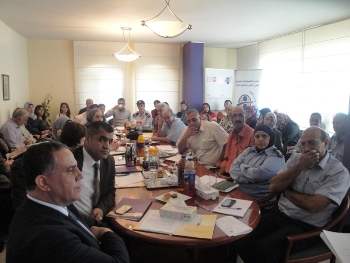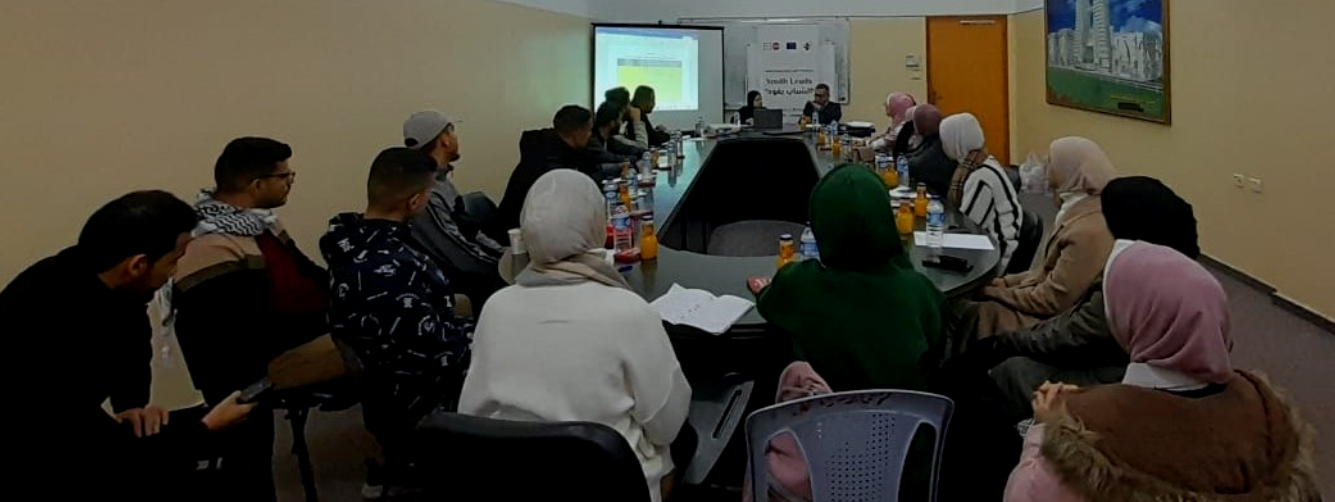
Ramallah – As a continuation of the hearing session on the referral system for women victims of violence in relevant ministries (health, women, justice, social affairs and the police), which was held at the end of 2014 in cooperation and coordination with the gender unit at the Prime Minister Office, MIFTAH recently held a public policy session with the ministers and institutions involved. The goal of the meeting was to discuss the recommendations of the first session and the latest developments pertaining to the implementation of the referral system. The participants also discussed ways of facing the challenges in implementing the system in institutions, as part of the “Support for the Protection of Women” program carried out by MIFTAH in partnership with UNFPA.
“Takamul” as a national system
The session was opened by MIFTAH project coordinator Hanan Sa'eed. After welcoming the audience, she explained that ever since the decision was taken, MIFTAH has worked and followed-up the implementation of Takamol system given its importance as a national system, stressing on the need to exert efforts to implement this system in the various sectors. In this regard, MIFTAH has intensified its work with involved parties in order to come up with ways of confronting the challenges that prevent the system from being put into effect to support women's access to justice and security.
The meeting was attended by representatives of relevant ministries and executive bodies in the various directorates from West Bank districts in addition to a number of civil society institutions. The participants reaffirmed the importance of the full implementation of the Takamul system, which was ratified by the Council of Ministers on 10/12/2013 and which aims to set the foundations for a national covenant for dealing with battered women and to achieve protection and care for women in the health, social and judicial sectors. It is also aimed at setting foundations and regulations that clarify and govern the framework for the relationship with the beneficiaries in addition to showcasing the rights and duties that come with the service.
Building team capacities
Sa'eed highlighted the recommendations of the previous meeting, which confirmed the call for building the capacities of the technical teams that work on cases of women victims of violence and for adopting comprehensive awareness programs about violence. The recommendations also called on the Council of Ministers to ratify a law that protects women from violence, and the need to create a database to support monitoring and evaluation processes at a later stage. Other recommendations included an assessment of the quality and feasibility levels of the services offered by civil society organizations, and ensure that the Gaza Strip is not neglected in the activities, plans and programs for combatting violence against women. They also called on all the partners to work towards rehabilitating trained teams capable of dealing with battered women.
The session’s facilitator and gender expert Lamia Shaladeh then took the floor to determine the basic points of discussion after listening to the achievements of the Ministry of Women’s Affairs in putting the system into effect. This was followed by discussing the challenges the ministries face in implementing the referral system.
Presentations
Head of the complaints unit at the Ministry of Women's Affairs (MoWA) Elham Sami who is also in charge of the unit that directly follows-up the implementation of the system in the health, social affairs and justice ministries, said her ministry was in the implementation stage. She said some of its parts had already been put into effect, especially in regards to the sector in charge of providing social services, which is the Ministry of Social Affairs. Still, she maintained, they had not reached the point of full implementation of the system, but said they had taken the first step.
Achievements
Sami also pointed that "so far some achievements had been made including: approval of a plan and mechanisms for implementation, start its implementation, and form a team from the Ministries of Women’s Affairs, Health, Social Affairs and the Police to set plans for its execution by each party, in addition to a review of the internal procedures that apply in each ministry".
Clear and comprehensive procedural guidelines
Wafa Muammar, a policewoman head of the Family Protection Unit in the Palestinian Police, said the enacted procedural guidelines for the police in dealing with violence against women were clear and comprehensive. “As the Family Protection Unit, we work on key issues to confront domestic violence, especially that directed at young girls”. She said the unit works in 11 districts and has 5-11 members in each district. She said the guidelines, which have been in effect for over a year, include an assessment of the cases of violence against women and the level of gravity they are subjected to.
In regards to the obstacles, Muammar said one of the main problems was the constant change in the team: “Because it is not permanent, this negatively reflects on the performance of the team as a whole”. In addition, she said one of the obstacles was that there were no budgets allocated to implement the system in the ministries. Another obstacle, she said, was the culture of some sectors regarding their perception of violence in addition to a lack of sufficient staff in some administrations and a lack of infrastructure in the three sectors that would enable it to implement the system.
Psychological support for battered women
On his part, Deputy Minister of Justice, Dr. Munther Abdallah reiterated the importance of providing psychological support to battered women and for the need for a support and pressure lobby in this direction. In this regard, he warned of absenting the role of the judiciary.
As for the most significant obstacles, Dr. Abdallah said these included the unwillingness of women victims of violence to file complaints at police stations. This he said, called for an active role of the media to shed light on this issue, in addition to activating the role of the law to prosecute perpetrators of violence. He stressed on the need for mechanisms and a system of protection for women. Abdallah also stressed on the fact that there are no legal texts that criminalize the perpetrator of violence with the suitable punishment, in addition to the need to allocate budgets and resources from relevant ministries towards enacting the system.
Dr. Abdallah pointed to the importance of spreading awareness in Palestinian society and the importance of implementing the law, followed up by monitoring and evaluation. He said problems with implementation existed in all sectors, calling on the Palestinian Legislative Council (PLC) to carry out its role in this regard.
Ramlawi: assault needs health care
Dr. Asaad Ramlawi, Director General of primary health care and public health at the Ministry of Health, meanwhile began by saying that "cases of assault need health care" and should therefore be dealt with from a comprehensive health view." He went on to say there must be a budget for a clear and comprehensive training program, which necessitates the existence of an integral national program with cooperation from local communities in implementing the system.
Cooperation between the Police and the Ministry of Health
Dr. Ramlawi pointed out to the cooperation between his ministry and the police, saying the ministry trained all health and nursing teams in clinics and hospitals.
He also addressed the social concept of violence, its reasons and motives and called for not limiting this concept to violence against women. As for the obstacles, Dr. Ramlawi said his ministry lacked a documentation process and a 'real issue with follow-up." Still, he maintained, they had an effective monitoring system whereby serious cases are referred to "Sehlters".
Mininstry of Social Affairs: accuracy in evaluation of level of seriousness
A presentation by the Ministry of Social Affairs' team called for clarity and accuracy in assessing the seriousness of the case by the partners, saying the ministry had prepared a procedures guide and a database still under construction.
Establishing a database and including the Gaza Strip
UNFPA Assistant Representative Ziad Yaish, raised the question of the status of implementing the referral system in the Gaza Strip.. Yaish recommended the establishment of a database in Palestine similar to the one in Jordan, saying this was a priority that must be addressed.
Council of Ministers: domesticating international laws
Saja Tirawi from the Council of Ministers focused on three main points: domesticating international laws pertaining to women's access to security and justice; reaffirming the coordinating role with partners including legislative intervention and mainstreaming the referral system; and third, following-up and assessment of the system through a supervisory committee.
Assessment of gravity level
In her presentation, Dr. Sabah Sharshir, director of social affairs in Nablus said the referral system must also be amended to include battered women with disabilities, and that it should be an automated system.








